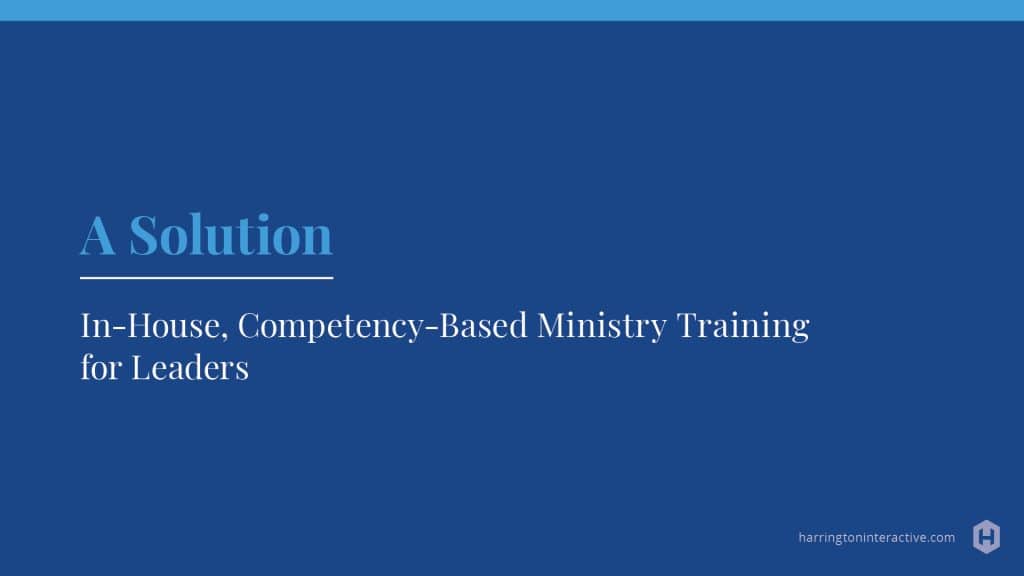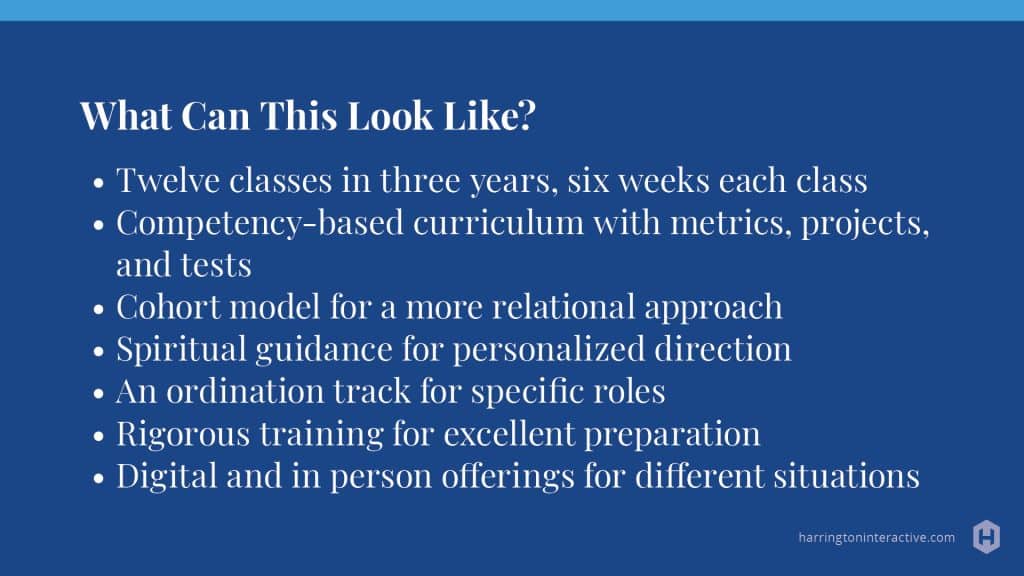Learn how to offer in-house leadership training from within your church by creating a robust program to equip leaders of leaders.
Note: The following is an adapted transcript from a teaching by Chad Harrington at the 2023 Renew Conference.
Listen to the original audio recording via the player above. Also available on Spotify, Google, and Apple.
Church leaders face a common problem: Their staff, elders, and deacons are serving in the church with little ministry training (if any). While many of them cannot go to seminary or Bible college for formal training, it still may be possible for them to receive formal ministry training from within your church. Join HIM Publications publisher and part-time teaching minister, Chad Harrington, to learn what it can look like to create an in-house ministry training program in a local church.
His home church, Harpeth Christian Church, has been training ministry leaders for ten years now, and they’ve learned a lot about what churches ought to do and not to do when training ministry leaders in house. Everyone should be trained for the work to which they’re called. The question is how. Consider the nuances of Chad and Harpeth’s particular training methods, classes, systems, rhythms, and processes for training ministry leaders.
A Personal Story: The Importance of Proper Training
Let me tell you a story that serves as a metaphor for a major challenge I see in churches today. My first job out of college in Nicholasville, Kentucky, was shredding paper for a mobile paper shredding company. I applied to 17 different jobs right out of Bible college while waiting to enter seminary at Asbury Theological Seminary. The only place I could get a job was at a paper shredding company.
During the interview, I wore a colored shirt and brought my resume, and asked what would separate me from all the other candidates. The guy looked at me and later told me he laughed because he had never seen anyone bring a resume to a paper shredding company. When I asked what would separate the person they hired from everyone else, he said, “Someone who can drive the truck.”
I didn’t know how to drive the truck, but they hired me anyway!
On the first day of work, the training consisted of driving the truck to a client’s location and shredding the paper. I barely knew how to work the truck or the massive and dangerous shredder in the back, but my supervisor said I was good to go after only thirty minutes of training. Plus, I was terrified of chopping off my hand with the industrial shredder, and I didn’t know the city at all. I made many mistakes, but I’m glad I kept my hand!
Now, compare that to ministry training in the church. How much more is at stake when it comes to training ministers, deacons, elders, staff members, and lay leaders? There’s a need to address the middle ground between small group facilitators and those who go through formal training at seminaries or Bible colleges.
The Problem of Insufficient Leadership Training in Churches
Ten years ago, my home church in Franklin, Tennessee, Harpeth Christian Church, started what we called at the time “leadership and ordination classes.” The primary goal was to train leaders in theology and the practices of our movement, as well as in disciple-making, Scripture interpretation, and our philosophy of ministry. Over the years, we have trained dozens of people who now serve as staff, executive pastors, and elders at our church.
Three years ago, I was appointed as the deacon of teaching to take over this ministry. Now called “Digging Deep,” this program consists of 12 classes over a period of three years, with each class lasting six weeks. We focus on training leaders of leaders, who make up about 1% of the congregation.
The Challenge of Untrained Leaders

The main challenge I’m addressing here is untrained leaders who are teaching, caring, and leading. When people step into leadership positions, it’s essential that they receive training to be effective in their roles. Not everyone can attend Bible college or seminary due to financial or logistical reasons. But they need training. What can we do?
Here’s the training options we brainstormed during my teaching at the Renew.org conference in Indianapolis in 2023:
- Bible college or seminary: Traditional education routes for ministry training.
- Mentoring: One-on-one guidance from experienced leaders.
- Internships and residencies: Hands-on learning experiences within church organizations.
- Books and videos: Self-directed learning through resources like books, videos, or online courses.
- Ministry experience: Gaining practical experience by serving in various roles within the church.
Each of these methods has its pros and cons, and the ideal approach for training untrained leaders may involve a combination of these strategies.
What I what to focus on, though, is an in-house ministry training program.
A Solution: In-House, Competency-Based Leadership Training for Ministry

Here’s what I propose: an in-house, competency-based ministry training program for leaders. Over the last 10 years, we’ve discovered that forming cohorts of a handful of people (around 1% of the congregation) works well for a church of our size. These cohorts take a three-year journey together. As I mentioned, we offer 12 classes in total—two in the spring and two in the fall—each class lasting six weeks.
Under my supervision as the teaching minister, I either teach or facilitate each class. We also offer video content for those who can’t attend in person, with live streaming on Facebook and recordings posted on YouTube. I meet with the cohort collectively at least twice per year, and I also provide one-on-one spiritual guidance. Participants take a spiritual gift inventory at the beginning so we can train them for their specific ministry calling.
Not everyone who goes through the program is ordained, but you must complete the program to be considered for ordination into a specific role like pastoral staff or elder. The aim is to train leaders for ministry within our church, aligning them with our theology and philosophy of ministry. Over the three years, we observe their growth and fruitfulness and provide guidance if they struggle.
What Can This Look Like?

The benefits of this model include:
- Locally-based
- Relational
- Economical
- Competency-based
- Robust teaching
In the end, the goal is to help people dig deep a well that can serve them throughout a long ministry, not just for the next class coming up.

To implement this program in your church, you may need a formally trained person to teach or facilitate the classes. Alternatively, you can use video-based teaching from competent teachers and have someone on-site to guide and facilitate the relational element, assignments, and assessments. The goal is to develop trained leaders, even if you need to start small and grow the program over time.
Peter vis-a-vis Paul
We need to train the untrained, and while some might argue that Peter was untrained and only needed to witness Jesus, he had actually gone to the school of Christ, where he received personalized, robust training. It wasn’t the type of training typical rabbis had, but it was training nonetheless. He was schooled in Scripture, interpretation, and practical ministry.
On the other hand, Paul (formerly known as Saul) had an impressive educational background. Born in Tarsus, a city known for its intellectual environment, Paul was trained under Gamaliel, one of the most respected rabbis of his time. He was well-versed in Hebrew studies and the teachings of the Pharisees. In addition to his Jewish education, Paul also received a Hellenistic education, learning Greco-Roman rhetoric, grammar, and logic. His extensive knowledge and unique cultural background equipped him to communicate the gospel effectively to both Jewish and Gentile audiences.
God uses everyone in between, from Peter to Paul and everyone with different levels of training. Yet I believe God wants all of us to be trained in one way or another. Some become scholars like Paul, some well-equipped leaders like Peter—and everyone in between.
So the question for you is, what training has God called you to? For all of us we know that God is calling us to love him with all of our mind. What if God is calling you and others in your church to engage in intense, contextualized, localized training?
Consider whether there is a training program you’re being called to lead or facilitate.

Q&A re: Leadership Training
Q: How might you start with this? Do you identify a group? Do you cast it to your whole church? How would you, if you have an idea?
Chad Harrington: I’m always hesitant to roll out something church-wide. Now we do announce our classes to the church, but I suggest some sort of filter system. So I recruit people and ask, “Hey, you want to take this class? Do you want to be an elder one day?”
I’d get a hit list of people that you definitely want to train, find out who’s willing to spend three years and a lot of time, and then just start with trying to get at least five people to start. Your classes are then offered to the whole church and there may be someone taking a particular class who may not be correct.
We’ll usually have 20 or 30 people sign up in a church of 500. But by the end of each class, we’ll end up with about half. That’s typical for us. But the cohort guys and ladies are there the whole time and those receive my focused attention.
Q: Does your church require people to have completed this class or anything like that?
Chad Harrington: For certain levels of leadership, I would say we grandfather certain people in there. There are relational and contextual ways to make that decision, but by default, we want everyone to go through this, but we make exceptions. Basically, I default to the senior leadership of our church, and they say they don’t need to go through it. There’s ideal and then there’s what works.
A Note from Bobby Harrington
Bobby is the Lead Pastor of Harpeth Christian Church and Point Leader of Renew.org.
In the Restoration Movement, people are not going to college and seminary as much any more. That doesn’t mean the churches don’t need those institutions. Geary can tell you about a bunch of churches in India and rural areas. They don’t have anybody. And so how do you raise up people to lead these churches? In the Renew network, through ways like what Chad’s talking about, you can provide the training, and then the network provides support with resources and everybody doesn’t have to have a doctorate. But in the network, there are people.
I know about the church-planting movements, having spent a lot of time studying them. The goal is to get everyday people in the game of leadership. The idea that you have to have a Bible college degree or a seminary degree? The Bible itself does not say that, and the local church has got to find a way to raise up leaders. And so I said more than I wanted to, but I would say I 100% agree with that. I know we like ours. For instance, we are missing young leaders. Like there are not enough pastors for the openings that are in our churches. And the biggest critique that I hear is that our universities aren’t training up young leaders, and I’m part of that group that’s critiquing that.
But then I ask myself, what am I doing in the local church? Were these universities founded to train up young leaders and pastors or not? It’s a problem to a certain extent, but is the church going to blame the universities, or are they going to take action?
Final Word from Chad
We’re all seeing the need to take action. Local churches can train up their own people, using a combination of tools available, our books at HIM Publications, and our free and instantly accessible video courses, many of which are a part of 12-course curriculum at Harpeth. When a small church cannot support this sort of program, maybe they rally and bring together a conglomerate of churches in the area who are aligned with the same denomination or movement. That’s really my vision. I would love to start working with Franklin and Nashville churches to help with this need. I believe that the future of theological education for most people will actually be in the church.

